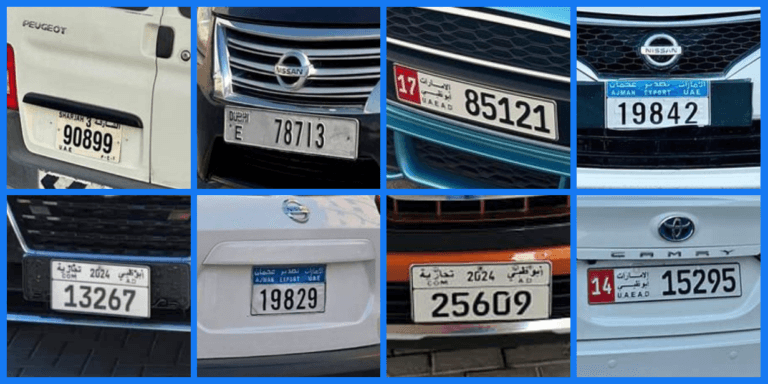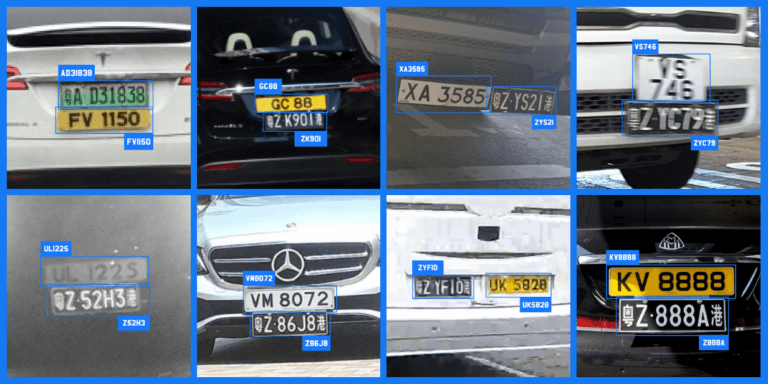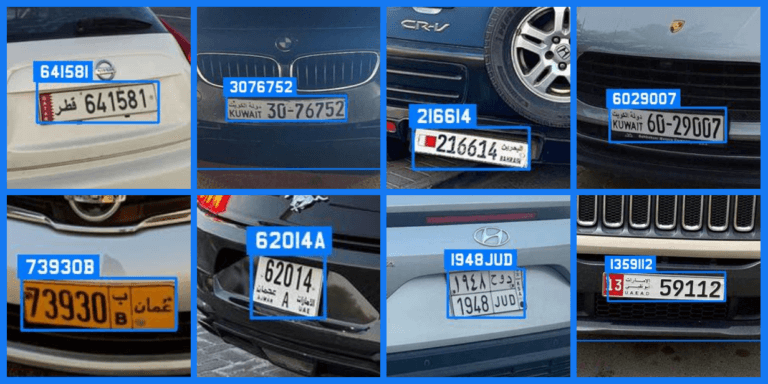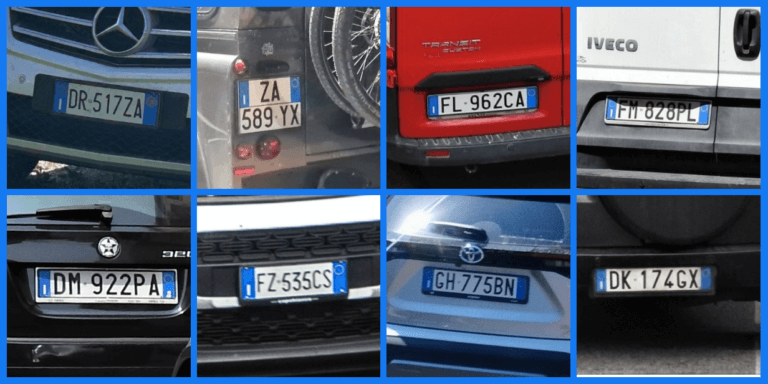License plates in the UAE are uniquely diverse, reflecting the distinct needs and designs of its seven emirates. With varying colors and formats, they present a challenge for automated license plate recognition (ALPR) systems. ALPR systems for the UAE must adapt to recognize plates with different layouts, fonts, and functions effectively.
Plate Recognizer, a leader in license plate recognition (LPR) technology, has addressed this complexity with a specialized engine. Designed to meet the demands of UAE license plates, this advanced solution accurately identifies UAE Plate Number and Plate Color, supporting efficient vehicle monitoring and enhanced security operations.
Ultimate Guide: UAE Number Plates Explained
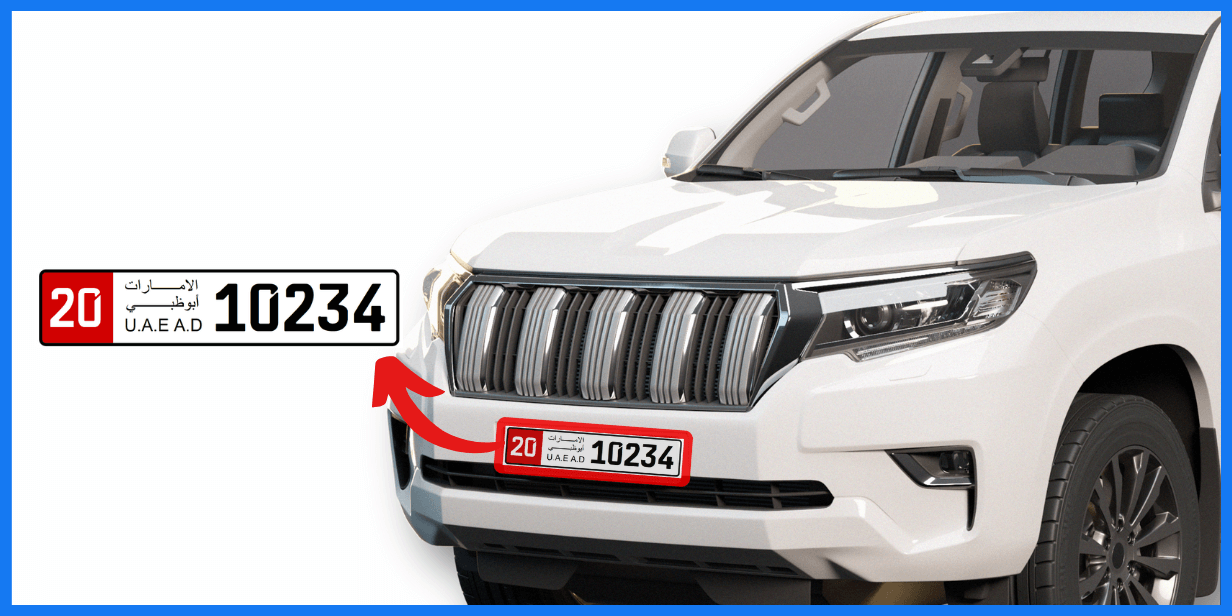
White car with UAE License Plate. License Plate Source: WikiCommons
The UAE’s license plate system is a complex yet organized structure that reflects the country’s commitment to road safety and efficiency. Each plate is designed to convey specific information about the vehicle, including its purpose, ownership type, and registration details. The system guarantees prompt identification and efficient management of cars throughout the seven emirates of the UAE by integrating Numbers and Colors. These two elements form the foundation of the UAE’s distinctive license plate system and are crucial for automated recognition and traffic monitoring.

Yellow Sports Car with Dubai License Plate: Source: Canva
Understanding UAE Plate Numbers
UAE Plate Numbers serve as unique identifiers for each vehicle. Their formats vary depending on the emirate and vehicle category, offering detailed information that supports traffic management and law enforcement.
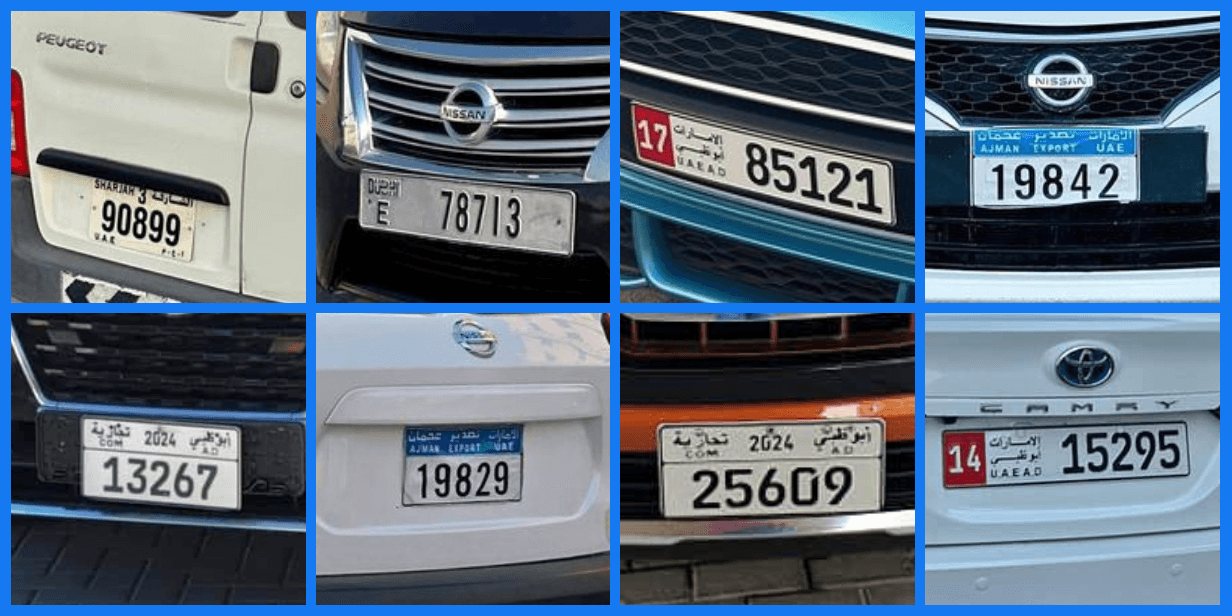
Various UAE License Plates. Source: Plate Recognizer
Variations in UAE Plate Number Formats
1. Alphanumeric Combinations
UAE plate numbers typically include a mix of numbers and letters, with the letters often indicating the emirate of registration. For example, “D” is commonly used for Dubai, while “AD” denotes Abu Dhabi.
2. Number Length
The number of digits can vary, often signifying different registration tiers or vehicle types. For instance, premium plates with shorter numbers (e.g., “777”) are popular and often auctioned for significant sums.
3. Arabic and English Text
Many plates feature bilingual formats, with Arabic numerals and English translations to ensure easy recognition.
Why UAE Plate Numbers Matter
Plate numbers are integral to vehicle identification systems for several reasons:
- Individual Identification – Every vehicle is uniquely identifiable, helping authorities trace ownership or track movements.
- Traffic Enforcement – Automated systems like speed cameras rely on accurate plate number recognition to enforce laws and issue penalties.
- Personalization – The UAE allows for custom and premium plate numbers, often used as a status symbol, adding another layer of variation for ALPR systems for the UAE to handle.
Understanding UAE Plate Colors
In addition to numbers, the color of a license plate in the UAE plays a crucial role in identifying its purpose. UAE Plate colors provide a visual layer of classification that supports law enforcement, traffic management, and security operations.
Why UAE Plate Colors Matter
UAE Plate colors add an extra layer of classification, helping to enforce regulations and streamline traffic management. For example:
- Yellow plates indicate taxis, ensuring they are easily identifiable for passengers and regulators.
- Blue plates are used for police vehicles, helping citizens and law enforcement quickly recognize them.
- Red plates signify military vehicles, marking them for official use and restricted access zones.
Applications in Traffic and Security
The ability to identify UAE plate colors is critical for law enforcement, toll systems, and parking management. Knowing a vehicle’s type at a glance simplifies operations, ensures compliance, and enhances security during events or emergencies.
How Plate Recognizer Reads UAE License Plate Numbers and Colors
Plate Recognizer’s system leverages advanced machine learning and image recognition technology to accurately interpret key features of UAE license plates and vehicles. How does Plate Recognizer work?
1. Plate Numbers
Plate Recognizer uses Optical Character Recognition (OCR) to extract alphanumeric details from license plates. Key features include:
- Dual-Language Capability – The system processes Arabic and English text seamlessly, ensuring accuracy in bilingual formats.
- Error Handling – Advanced algorithms detect and correct distortions caused by motion, lighting, or obstructions, improving reliability.

Tall Buildings in Dubai. Source: Canva
2. Plate Colors
Plate colors provide critical insights into a vehicle’s purpose. The system detects these through:
- Color Segmentation – Analyzing the dominant color on the plate and cross-referencing it with known UAE classifications, such as yellow for taxis and blue for police vehicles.
- Lighting Adaptation – The system compensates for challenging lighting conditions, ensuring consistent color detection even in shaded or low-light environments.
3. Vehicle Make, Model, and Color
Beyond license plates, Plate Recognizer’s Vehicle Make Model Recognition (VMMR) adds another layer of identification. This feature:
- Identifies Vehicle Types – Covers over 9,000 vehicle makes and models globally, including sedans, SUVs, buses, and motorcycles.
- Detects Vehicle Colors – Recognizes vehicle colors like white, black, blue, and red, even in shaded conditions or partial lighting.
- Supports Contextual Identification – Helps authorities and businesses quickly identify vehicles using a combination of license plate data and visual appearance.
Real-Time Integration
Plate Recognizer processes these elements in real time, making it ideal for applications such as toll collection, parking systems, and traffic monitoring. With the ability to identify Plate Numbers and Colors alongside vehicle attributes, the system ensures accuracy and efficiency across diverse scenarios.
This comprehensive approach strengthens vehicle monitoring and enhances security operations by integrating multiple layers of data into one powerful solution.
Benefits of Using Plate Recognizer for UAE License Plates
Plate Recognizer’s engine is specifically designed to meet the unique needs of the UAE:
1. Accuracy and Reliability
The engine is designed to handle the complexities of UAE plates, ensuring precise recognition of Plate Numbers and Colors, regardless of regional variations.
2. Real-Time Capabilities
With the ability to process plates instantly, Plate Recognizer supports time-sensitive applications like toll collection and security monitoring.
3. Adaptability
The system’s machine learning foundation allows it to evolve alongside new plate designs or updates, ensuring long-term reliability.
4. Efficiency
Plate Recognizer saves organizations and agencies time and resources by automating operations like vehicle classification and monitoring, which eliminates the need for manual intervention.
5. Versatility
Whether for parking management, fleet monitoring, or law enforcement, Plate Recognizer’s features cater to a variety of industries and applications.
With these advantages, Plate Recognizer is an invaluable solution for streamlining traffic management and enhancing security in the UAE.
Effortless License Plate Recognition for UAE Roads
The UAE’s license plate system is both diverse and intricate, presenting unique challenges for automated recognition systems. Plate Recognizer’s specialized engine rises to the challenge, of accurately identifying UAE Plate Numbers and Colors to streamline traffic management and enhance security.

Car in the desert. Source: Canva
For the UAE’s unique requirements, Plate Recognizer offers a dependable and effective solution for managing parking lots, tolling systems, and car fleets.
Ready to see it in action? You can try Plate Recognizer for free by signing up for an account today. Experience how our technology can effortlessly transform your vehicle monitoring and recognition operations.
